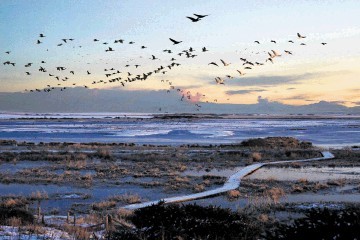
A leading animal welfare group that Donald Trump attacked for dropping its objection to an offshore windfarm scheme has revealed plans for its own green energy project at a north-east nature reserve.
RSPB Scotland wants to instal a wind turbine at its Loch of Strathbeg site, on the coast between Fraserburgh and Peterhead. The plans came under fire last night from a campaign group that accused the society – which often objects to such schemes itself – of double standards.
The reserve, which is the UK’s biggest dune loch, is home to nearly 300 species of bird and enjoys annual visits from about 60,000 Icelandic geese.
A planning application for a turbine 62ft above the south-west corner of the site has been now lodged with Aberdeenshire Council. It comes just days after Mr Trump dubbed the charity “the Royal Society for Killing Birds” after it withdrew its opposition to the proposed £230million, 11-turbine European Offshore Wind Deployment Centre in Aberdeen Bay.
The businessman claims the development will destroy views from his luxury golf resort nearby.
Loch of Strathbeg management – who have objected to several nearby wind turbine projects on the edge of the reserve in recent years – say great care has been taken to ensure the turbine tower will not significantly affect the birds’ habitat. A spokesman said: “RSPB Scotland is pursuing this project as an opportunity to generate renewable energy, thereby contributing to the reduction in carbon emissions as part of the fight to tackle climate change, which it considers to be the biggest threat to global biodiversity.”
He said a potential collision survey at the site calculated that 0.19 pink-footed geese would be at risk of flying into the mast every year – about 0.0004% of the annual visiting population.
About 0.23% of the site’s resident whooper swans would also be put at risk.
Last year, the charity opposed plans for a four-turbine development near Crimond, saying the project would pose considerable risk to geese and swans.
Kim Terry, secretary of Communities Against Turbines Scotland, said: “These plans by the RSPB smack of double standards as they often object to wind-turbine applications on the grounds that they are harmful to birds.”